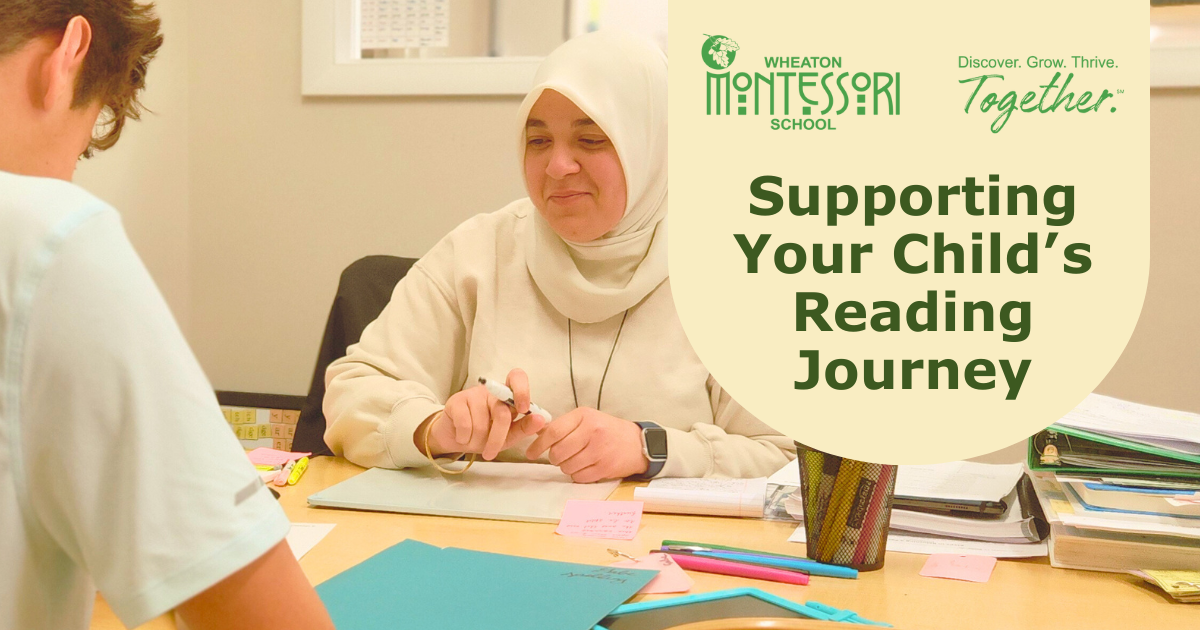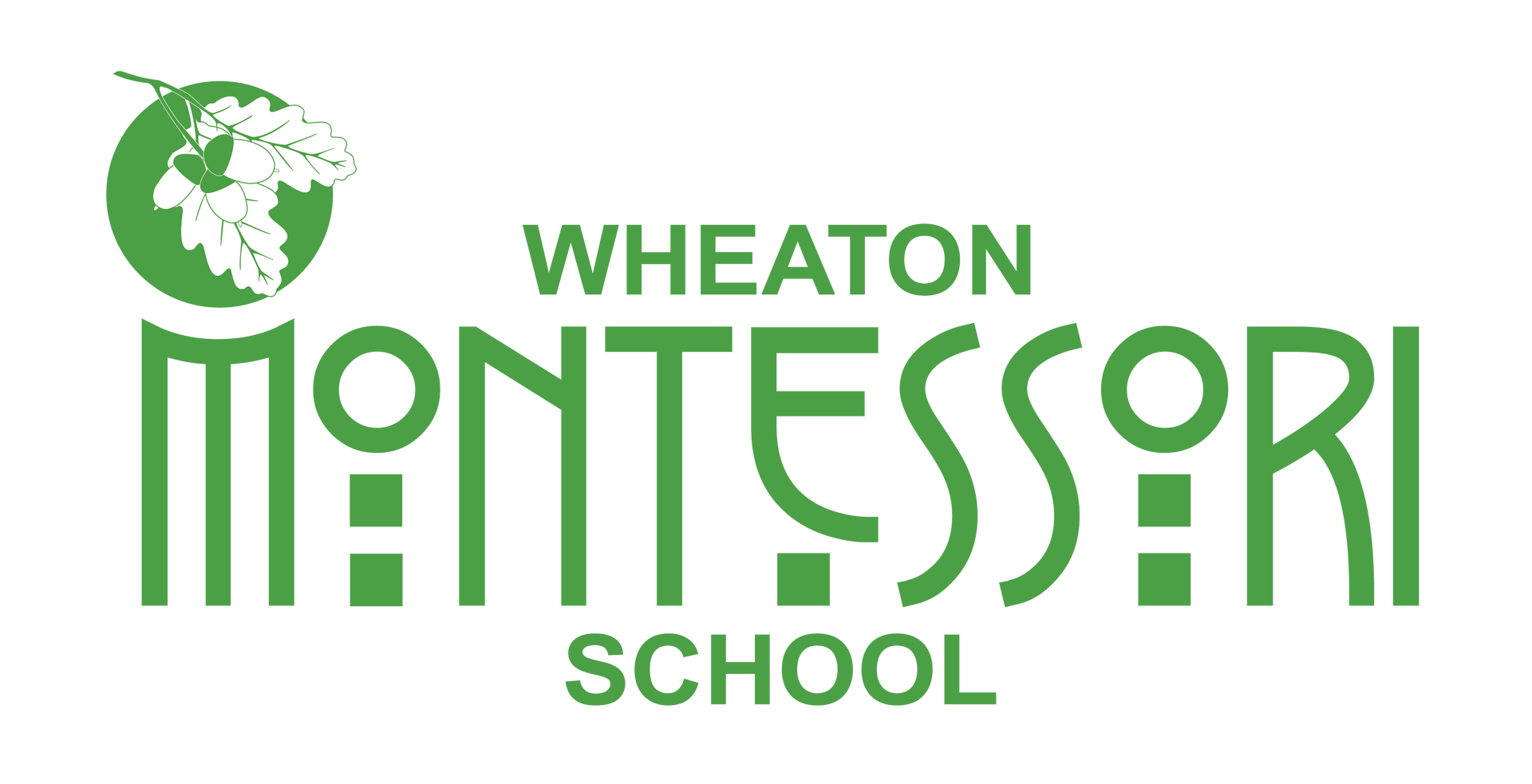
Parents often wonder what they can do at home to support their child’s reading development without causing overwhelm. A key part of effective reading support is to encourage rather than force, and to explain rather than require. Ms. Mariam Mohamed, Reading Specialist at Wheaton Montessori School, provides some suggestions you can implement to help promote pleasure reading at home.
Let Their Interests Take Precedence
Wide reading refers to the practice of reading a diverse range of texts on various topics. Reading an extensive range of genres, disciplines, and formats—such as newspapers, books, graphic novels, online articles, magazines, picture books, and audiobooks—enhances the reader's vocabulary, background knowledge, and reading comprehension.
But as our children’s guides and mentors, we need to be careful not to rush wide reading. It's best to let it unfold naturally, as their curiosity and confidence grow. If, for example, your child insists on reading only dinosaur books or prefers graphic novels, support their interests by ensuring that these kinds of books are available to them. Doing so allows for two important things to happen:
- Your child begins to associate independent reading with genuine enjoyment.
- Seeing reading as enjoyable can become a catalyst for developing an interest in a wider range of texts over time.
Children will come to appreciate the value of extensive reading in their own time. If they consistently read outside of school, we shouldn't be too concerned about how long it takes to get them there.
Read To Your Child
Another way to encourage wide reading without forcing it is by reading books of various genres to your child. The way you introduce a book, and your own show of excitement and interest in it, can motivate your child to seek similar books out for themselves. Reading aloud to your child also creates a meaningful bonding experience and offers a natural way to scaffold topics and texts that may have otherwise felt unapproachable to them.
Just have a Chat (about books)
Engage in casual conversations or discussions with your child regarding the books they are reading. Use open-ended prompts like “Tell me about it” or “I wonder how that felt” to ensure the dialogue feels more like an exploration rather than a quiz or a series of questions with a single correct answer. Ask them what they thought of the book and why, what did they loved about it, what did they dislike, would they recommend it to a friend, why or why not?
One way to make book talks more engaging and genuine is to read the book with your child. This could look like: I read a chapter, you read a chapter; I read a page, you read a page; or we both read the same book separately and come together to discuss it. When I was a classroom teacher, I would read the chapter(s) for the day ahead of time, before reading them aloud to my students. I did this for several reasons, but mostly because I knew that children could sense authenticity; I wanted them to know that I was as engrossed by the content of our reading as they were. Reading a book alongside your child can spark the kind of organic conversations you may find in a book club.
One discussion option that doesn’t require prior knowledge of the text is the Book
Interview. I’ve found that this format is especially appealing to emergent readers and younger students (Kindergarten - 4th grade). Grab a real or fake microphone and make believe you're a TV show host and that your child is a guest star on your show! Carve out 15 - 20 minutes — this can be done weekly, monthly, or when they finish reading the book — to ask your child a set of questions about their book. Check out this post to read more about book interviews and download a list of questions for both fiction and nonfiction texts.
Explain Rather Than Require
Eliminate phrases like “Because I want you to” or “Because I said so” from the equation of pleasure reading. Like adults, most children are curious about the reasons behind tasks. Simply discussing the importance of reading across different genres and formats, such as being well-informed, expanding vocabulary, and understanding the world, can effectively persuade them to diversify their reading habits. Introduce appropriate and accessible independent reading choices to help them discover the variety available. For instance, if your child enjoys graphic novels, they might find the History Comics and Science Comics series appealing. Moreover, graphic novels and picture books can enhance a reader's visual literacy and inference skills on their own. Check out Illustrated Chapter Books for Middle Grade Readers for a selection of transitional chapter books that may captivate graphic novel fans.
Help them Choose a Just Right Book
A “just right book” isn’t too hard or too easy for its reader. It’s challenging enough to be interesting, but not so challenging that it leads to frustration. Encourage your child to ask themselves: Can I read most of the words in this book on my own? Can I decode the few words I don’t know? Am I understanding most of what I’ve read so
far? Does the topic interest me? Ask your child to read a few pages out loud. If their reading sounds choppy or if you notice signs of frustration, guide them toward a book that may be a better fit.
Make Library Visits a Habit
I remember vividly as a nine-year-old in a new country, making my first trip to my local public library— borrowing what felt like a limitless number of FREE books, VHS tapes, and DVDs. I’d curl up with a book in comfy nooks in the “some noise permitted” children’s floor, momentarily forgetting the world around me. Today, going to the library has become a lost joy. I encourage you to bring it back: make it a weekly family ritual, build excitement around it, and help your child rediscover its magic!
Public libraries today house a multitude of both online and in-person resources: Study rooms, computers, weekly events, story times, and even online language learning (accessible through a free library card), just to name a few services. You can utilize the online library catalog at home or at the library to search using keywords of what you’re looking for or exact titles. You can also simply walk up to the service desk and ask a librarian for help or book recommendations. Wheaton Public Library partners with several neighboring libraries, ensuring that patrons can place holds and borrow books that are not available at their home library. Illinois operates under a reciprocal borrowing system, allowing Illinois library cardholders to use their library card at most public libraries across the state. Find out more about interlibrary loans here.
We would be delighted to hear about your child's or children's favorite books, so please share them with us!
Prospective families with toddlers and children under 4 are encouraged to sign up for a school tour to sign up for a school tour to explore the advantages of our Primary Program, which lays the essential foundation for our Elementary and Adolescent Community Programs*. Prospective families who are enrolled in the 2025-2026 School Year are welcome to sign up for Wheaton Montessori School summer camps.
Open enrollment for summer and fall 2025 will be through May 20th and is based on availability for eligible early childhood students. There are extremely limited spots available for new children aged 4 and under for the upcoming summer and fall of 2025.
* Individual school tours for kindergarten through 9th grade are not available, and the waitlist remains closed for the 2025-2026 School Year. The only exception is considered for students transferring from AMI-accredited Montessori schools that have maintained continuous attendance.


